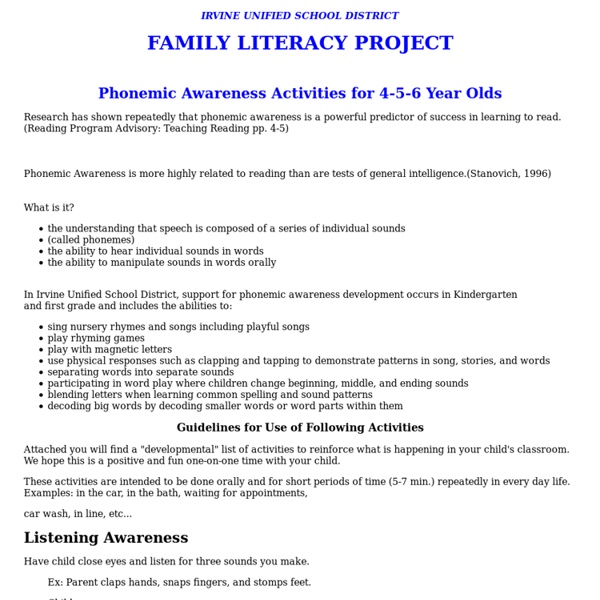Irvine Unified School District: Phonemic Awareness Activities for 4-5-6 Year Olds

Phonemic Activities for the Preschool or Elementary Classroom
This article features activities designed to stimulate the development of phonemic awareness in preschool and elementary school children. The activities originally appeared in the book Phonemic Awareness in Young Children: A Classroom Curriculum. Listening to sequences of sounds From chapter 3: Listening games Objective To develop the memory and attentional abilities for thinking about sequences of sounds and the language for discussing them. Materials needed Objects that make interesting, distinctive sounds. Activity In this game, the children are challenged first to identify single sounds and then to identify each one of a sequence of sounds. Once the children have caught on to the game, make two noises, one after the other. After the children have become quite good with pairs of noises, produce a series of more than two for them to identify and report in sequence. Variations With the children's eyes closed, make a series of sounds. Nonsense Book of familiar stories or poems Clapping names
40626_1.pdf
Phonological Awareness
Age: Preschool-Kindergarten 1. Hot Potato The children will all sit in a circle on the floor. 2. 3. 4. 5. 6. 7. 8. 9. 10. 11. 12. Age: Preschool-Kindergarten 1. 2. 3. 4. 5. (Teacher Verse) ~ What’s the last sound that you hear? (Student Response) ~ /g/ is the sound that I hear, ~ That I hear, that I hear. ~ /g/ is the sound that I hear ~ At the end of dog. Age: Kindergarten-First Grade 1. 2. 3. 4. Using ten pairs of cards with familiar 3-sound pictures on them, shuffle the cards, turn them over in a 4X5 grid and play a game of Memory with the cards. - Materials 5.
Related:
Related:




This website is great for both teachers and parents because of all of the different activities they can do with the students. The site is more focused for new readers but can also be used for older struggling readers. The activities are fun and engaging and I can see many students enjoying learning to read. by vortiz3 Nov 5
I appreciate the focus that this site places on parents/guardians working on literacy skills with their kids. Although these activities can also be done in a classroom, I could see myself distributing this link to my students' parents for those who want to know what they can do with their young literacy learners at home. by theofficepicnic Jul 25
I like how it explains what phonemic awareness is. It also provides parents/teachers with activities that they can then practice with their children (like rhyming games). by msilvadun10 Jul 24
This is a great site with activities for parents to work on with their children. It gives an overview of phonemic awareness and how parents can help their children. by jkor Jul 18
Although the exercises on this page are intend for very young children I have used the various vowel sound elements when working with an older student for EDUC2260. I have found that I need to reinforce some of the material found on this page as the student I work with periodically misplaces the emphasis within a word or makes short vowel pronunciation errors. by alarsen1 Jul 13
This site gives parents an opportunity to learn about the importance of phonetic awareness and to practice with their children. by jortega Mar 12
This site consists of ideas for working with students between the preschool and first grade ages. The site has several fun, simple ideas that can be used in every day life to help construct phonemic awareness in a student's learning. by kbeck07 Nov 4